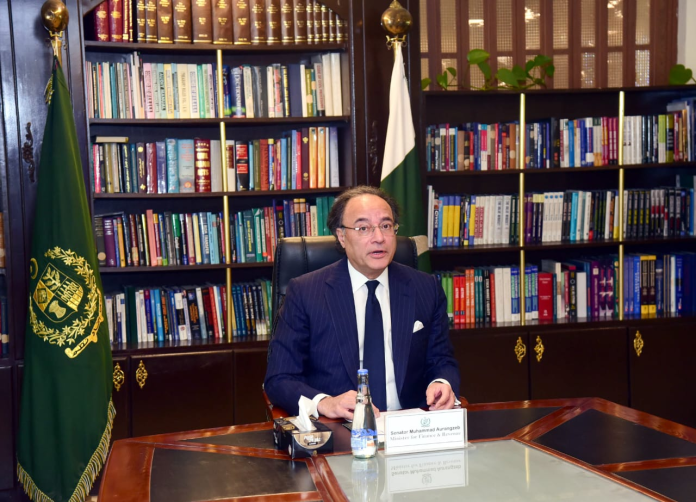ISLAMABAD/KARACHI – DEC 13 (DNA):Federal Minister for Finance and Revenue Senator Muhammad Aurangzeb has said that Islamic finance and Islamic capital markets can play a pivotal role in helping Pakistan remain steadfast on the road to macroeconomic stability and sustainable growth.
He said that Pakistan had faced significant economic challenges in recent years. However, those issues were now being effectively addressed, and the country was on the right trajectory towards microeconomic stability and sustainable growth. He said Islamic finance, specifically Islamic capital markets, could play a pivotal role in this road to market as instruments such as sukuk, equity funds, and Shariah-compliant investment vehicles not only attracted investment but also reduced reliance on interest-based borrowing.
This was stated by the Minister while addressing virtually the inaugural session of the Second International Islamic Capital Markets Conference & Expo that opened in Karachi today. Shaikh Ebrahim Bin Khalifa Al-Khalifa, Chairman, AAOIFI Board of Trustees, Dr. Sami Al-Suwailem, Acting Director General, Islamic Development Bank Institute, Mr. Akif Saeed, Chairman SECP, Mr. Saleemullah, Deputy Governor SBP, and other senior delegates attended the session.
In his keynote address to the session, the Finance Minister described the conference as reflective of Pakistan’s growing commitment to fostering a robust Islamic capital market, highlighting the country’s dedication to transforming its financial ecosystem in line with Shariah principles.
He said the Government of Pakistan remains firm in its commitment to transforming the financial system in line with Shariah principles, adding that as of June 30, 2024, 56% of market capitalization at the Pakistan Stock Exchange comprises Shariah-compliant securities. “In the collective investment segment, 48% of assets under management of mutual funds, 66% of assets under management of voluntary pension funds, and 95% of assets under management of REITs are already Shariah-compliant. These statistics deflect the progress that we have made over year.”
Senator Muhammad Aurangzeb underlined the need for “an economic system that is not only in line with our faith but also capable of inclusive and sustainable economic growth”. “Only then, we will be able to extend the benefits of all our efforts to the citizens of Pakistan,” he added.
He said that Islamic finance and instruments such as sukuk, equity funds, and Shariah-compliant investment vehicles were vital tools for mobilizing resources for critical sectors, including infrastructure development and poverty alleviation through Islamic social finance, while maintaining adherence to ethical and transparent principles. “With these mechanisms in place, Pakistan has the potential to emerge as a leading global hub for Islamic finance,” he added.
He noted that a growing interest in Shariah-compliant investment products was a testament to the increasing global demand for ethical and sustainable financial solutions. “The steady and healthy growth of Islamic finance, both in Pakistan and internationally, reflects the shifting preferences of investors towards value-based financial systems,” he said, adding “this demand has spurred interest from market participants across sectors, both within and outside of banking, which is contributing to the creation of a comprehensive Islamic finance ecosystem”.
The Finance Minister further noted that full realization of the potential of Islamic finance was not possible without collective and collaborative efforts of scholars, financial institutions, regulatory bodies, and industry practitioners to address existing challenges, develop innovative Shariah-compliant financial products, and build public trust. “We must ensure that Islamic finance is not only rooted in Shariah principles but also practical, transparent, and capable of meeting the evolving needs of our people,” he added.
In the end, the Minister commended the efforts of SECP for advancing Islamic finance in Pakistan and its initiatives in creating an enabling regulatory environment to support Islamic finance in the non-bank financial sector as well as stablishing Shariah-compliant indices, introducing Shariah governance frameworks, and developing guidelines for offering Islamic financial services. He, however, urged the SECP to continue to make dedicated efforts toward innovation and inclusivity in Islamic capital markets.

















